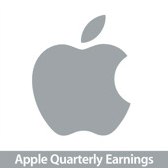Behind Apple's Q2 earnings bonanza: The flight to quality


The reason is easy to understand, which means that it's incomprehensible for most technology-inclined users and analysts to grasp: when times are tough and there's little money in the budget to gamble on a technology (or most any other product for that matter), customers will go with quality, or in this case, the product that has the best chance of working and working well.
Interviewed after the analyst conference call, A. M. Sacconaghi Jr., an analyst at Sanford C. Bernstein & Company, told the New York Times that the upside of the results (also described as "gargantuan relative to expectations”) was due to an "unexpected surge in iPhone sales."
“People want a computer in their pocket,” he said, “and Apple is at the very forefront of that business.”
Sacconaghi is wrong on the first point and spot-on with the second. What people want is a computer in their pocket that actually works, that doesn't crash all the time and that has great apps. And Apple is the company that offers quality and an integrated solution that really works.
I spoke to an owner of an Android phone the other day and he said he was ready to buy an iPhone. He was tired of the problems with the phone and felt that iPhone apps were better than the ones he was currently using.
From Apple CFO Peter Oppenheimer:
"We are thrilled to have sold 8.75 million iPhones during the quarter, an all-time high exceeding the previous record set in the most recent holiday quarter. This represents 131 percent year-over-year growth over the previous March quarter’s results and is more than three times the IDC's published estimate of 41 percent growth for the Smart Phone market overall in the March quarter. Recognized revenue from iPhone handset sales, accessory sales and carrier payments was $5.45 billion during the quarter compared to $2.43 billion in the year-ago quarter. The sales value of iPhones alone was about $5.3 billion and dividing this by the 8.75 million units yields an ASP of about $600."
Timothy Cook added:
"If you look in terms of geography we had some staggering growth rates as you mentioned. If you look at Asia Pacific as an example the iPhone units in Asia Pacific grew 474 percent year-over-year. Japan grew 183 percent. Europe grew 133 percent and so these are some fabulous numbers we are seeing just incredible demand for iPhones. Some of this was led by adding eight carriers in some key countries."
Are all these new iPhone customers dumb for not picking some other vendor's smart phone? No. Rather, it appears that they understand Apple's value proposition better than the analysts.
It's the same difference with the Macintosh. Here's Oppenheimer on Mac sales:
"We generated record March quarter sales of 2.94 million Macs. This represents 33 percent year-over-year growth compared to IDCs latest published estimate of 24 percent growth for the market overall in the March quarter. We were very pleased with Mac sales growth in each of our geographic segments and we experienced strong, double digit growth for both desktop and portable categories."
These sales happened despite the anticipated refresh of the MacBook Pro lines, which happened last week, outside the quarter being reported.
Analysts and PC users keep pointing to competition from netbooks and cheaper PC notebooks. But what is happening? Customers are buying the higher-priced product because of its value and reliability.
Another anecdote: I recently flew from Washington D.C. to San Francisco and decided to count the different notebooks visible from my seat in the back of the coach cabin. This was an ordinary flight in the middle of the week not tied to a technology conference.
What astounded me were the number of Macs: they about equaled the number of PCs in use. Around me were a couple of MacBooks, a couple of MacBook Pros and a MacBook Air. I counted 4 PC notebooks (2 big black ones) and only one netbook.
No doubt, there were more PCs under the seats and in the overhead compartment. Still, of the folks that needed to get work done around me, half of them were using Macs. One of my seatmates used her MacBook Pro to get a presentation done.
Oh, and by the way, according to Gartner estimates from last week, Apple had an 8 percent share of the US market. The problem with that calculation is that they are based on Gartner's guesstimate of 1.398 million units and Apple's real number was 2.94 million.
As I mentioned in January, the Mac gets no respect. And with all the questions from analysts yesterdday about the iPad cannibalizing Mac notebook sales, that trend looks likely to continue. Sigh.